人教版高中英语必修五Unit1
人教版高中英语必修五 Unit1_过去分词作定语和表语 语法训练 含答案
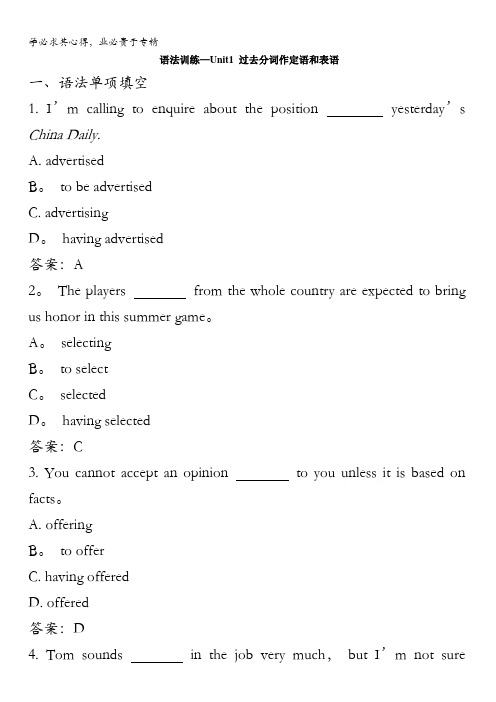
语法训练—Unit1 过去分词作定语和表语一、语法单项填空1. I’m calling to enquire about the position yesterday’s China Daily.A. advertisedB。
to be advertisedC. advertisingD。
having advertised答案:A2。
The players from the whole country are expected to bring us honor in this summer game。
A。
selectingB。
to selectC。
selectedD。
having selected答案:C3. You cannot accept an opinion to you unless it is based on facts。
A. offeringB。
to offerC. having offeredD. offered答案:D4. Tom sounds in the job very much,but I’m not surewhether he can manage it。
A。
interestedB. interestingC. interestinglyD。
interestedly答案:A5。
Amie Salmon, disabled, is attended throughout school days by a nurse to guard her.A。
to appointB。
appointingC。
appointedD。
having appointed her。
答案:C二、单句语法填空1。
The salesgirl at last handled the difficult customer and gave a (satisfy)smile。
答案:satisfied2。
人教版高中英语必修五unit1课件1
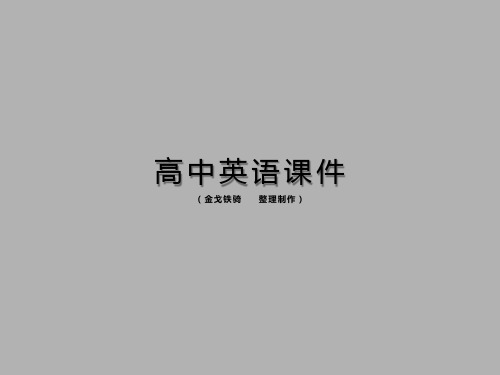
sorb
clusion llenge apart
sense
1.conclude vi.终结;结束;推断;决定 [典例] 1)Themeetingconcludedatteno'clock.会议于十 点钟结束。
2)Itishardtoconclude.这很难断定。 [重点用法] conclusionn.结束,结论 make/draw/reach/cometo/ arriveataconclusion下结论,得出结论; bringsth.toaconclusion使…结束; inconclusion作为结论,最后;
• [练习]汉译英 • 1)他们在我们不在时管理事务。 • 2)他在这个领域很出名,今晚会有成千
上万的敬仰者参加他的讲座。
1) Theyattendedouraffairsduringourabsenc e.
2) 2)Heisfamousinthisfield,andtensofthousa ndsoffanswillattendhislecturethisevening.
Theequipmentcanabsorbmoisturefromth eair这一设备能从空中吸收水分 • 2)Heisabsorbedinstudy.他专心读书。
1.背诵重点单词和短语。 2.完成小卷子。
• 2.attendv. • 1)注意;留意;处理(与to连用)=dowith • 2)出席;到场: • 3)照看;照料:=takecare;lookafter • [重点用法] • attendschool上学 • attendalecture/meeting听讲座/出席会议 • attendawedding/ceremony出席婚礼/参加典礼
人教版高中英语必修5_unit_1_单词讲解
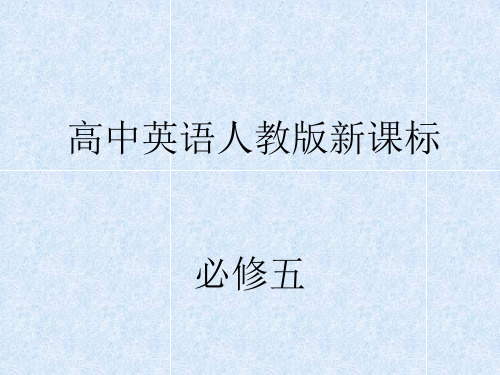
10. expose vt. 暴露,揭露, 使曝光 expose crime揭露罪行 expose the truth揭露真相 • expose sth./sb./oneself (to...) 暴露某事物/某 人/自己(给……) expose sb/sth 揭发某人/某事 be exposed to 暴露 expose…to…“把……暴露于……之下(之中), 使……受到……作用” expose a child to books exposed adj. 暴露的,暴露于风雨中的,无掩蔽的 exposure n. [u]暴露;揭露,揭发 expose one’s skin to the sun 使皮肤暴露于阳光下
• take part in 指参加会议或群众性活动等, 着重说明句子主语参加该项活动并在活动中 发挥积极作用。 • We'll take part in social practice during the summer vacation. 暑假期间我们将参加社 会实践。 • take part in是惯用词组,part前一般不用冠 词,但part前有形容词修饰时,要用不定冠 词。Lincoln took an active part in polities and was strongly against slavery. 林肯积极 参加政治活动,强烈反对奴隶制。
vt. 治愈;治疗
curable adj. 可治愈的 a cure for... 针对……的治疗 cure sb. of sth. 改正某人的坏习惯;治愈某人的疾病
• 区别cure/treat/heal (1)treat指通过药物、特别的食品或运动治病,强 调治疗过程,不一定治好。
• treat sb. for sth.医治某人的病;还可作“对 待,看待”讲,treat...as把……看作/视为。 (2)cure意为“治愈,痊愈”,特别指病后的恢
人教版高中英语必修五book5 unit1 reading知识点

11
注意:
immediately, the moment, directly, instantly 等 与 every time一样,都可以用作连词引导时间 状语从句,意为 “一…..就”。
e.g. I will give the letter to him immediately I see him.
1
1.Who put forward a theory about black holes. 谁提出了黑洞理论
put forward (1) 提出(+表示建议,计划等的名 词)= come up with
e.g. put forward a very good suggestion/plan 提出了一个很好的建议 /计划
Smith. 昨天我们看见的那个人是史密斯先生. 7
(2) expose ① 使暴露于;使接触到 expose sth/sb to 使…暴露于…;使面临;
使遭受(危险,攻击等) be exposed to 招致,遭受 翻译:呆在户内,别把你的皮肤暴露于太阳底下 Keep indoors and don’t expose your skin to the sun.
8
5.deadly (1) adj. 致命的,致死的;毒性的 e.g. This is a deadly poison. 这是一种致命的毒药。 (2) adv. ①死一般地 e.g. His face was deadly pale. 他的脸死一般地苍白。 ② 非常,极度地 e.g. The air was deadly cold. 空气极度寒冷。
(2) 把...向前拨
人教版高中英语必修五:Unit 1 Great scientists 语法归纳 过去分词作表语和定语

§语法归纳过去分词作表语和定语1.过去分词作定语过去分词作定语与所修饰词之间存在两种意义关系:一是及物动词表被动意义(或已完成的被动动作);二是不及物动词表示完成意义。
an organized trip有组织的旅行(被动)The question discussed was very important.被讨论的问题非常重要。
(即表被动又表完成)boiled water开水(完成)fallen leaves落叶(完成)(1)单个的过去分词作定语一般放在被修饰的名词之前,有时也放在被修饰的名词之后。
My friend is a returned student.我的朋友是个归国的留学生。
The excited people rushed into the hall.激动的人们冲进大厅。
There is no time left.没有多少时间了。
(2)过去分词短语作定语要放在被修饰的名词后面,作后置定语,作用相当于一个定语从句。
The student dressed in white is my daughter.=The student who is dressed in white is my daughter.穿白色衣服的学生是我的女儿。
Is there anything planned for tonight?=Is there anything that has been planned for tonight?今晚安排了什么活动没有?The book, written in 1957, tells the struggle of the miners.=The book, which was written in 1957, tells the struggle of the miners.这本书是1957年写的,讲的是关于矿工斗争的故事。
2.过去分词作表语过去分词作表语,表示主语所处的状态(用作表语的过去分词大多已形容词化)。
人教版英语必修五unit1建议信
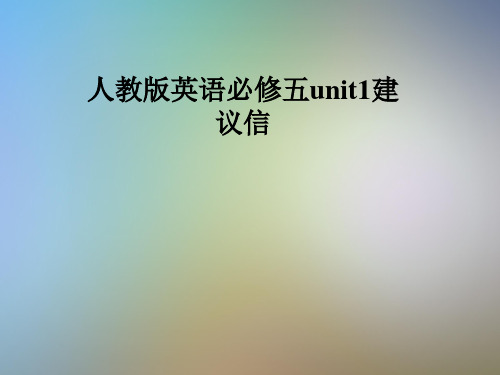
•第一步:审题
•养成重视审题的习惯。虽然基础写作题是半封闭性的, 但审题仍然十分重要。现以样题为例,谈谈如何审题:
思考的问题 第几人称?(person) 文章的题材是什么?
要写的文章主题是什么 (topic)
怎样安排信息点的顺序? (order)
动作是什么时候发生的?(时态) (when)
样题分析
• B. When taking part in a class discussion, you should take part in it and tell others what you think actively.
• C. You should participate in the discussion positively and make your voice heard actively.
•第二人称 •一封信
•好友李明在交友过程中遇 •到了困难,给其建议
•说理逻辑性
•现在时
第二步:搜索相关词组或句型
• 1. 词汇: •(1).很难与他人交流 • have trouble/difficult in communicating with others •(2).感到孤独 • feel lonely •(3).采纳下面的建议 • adopt the following advice/suggestions •(4).了解他人的兴趣
•2. 句式练习 一句多译
• (1).你在信中说,你与别人交流时有困难。 A.In your letter, you said you were
not good at communicating with others.
• B. In your letter, you said you had difficulty/trouble in communicating with others.
高中英语人教版必修五unit1单词讲解与拓展
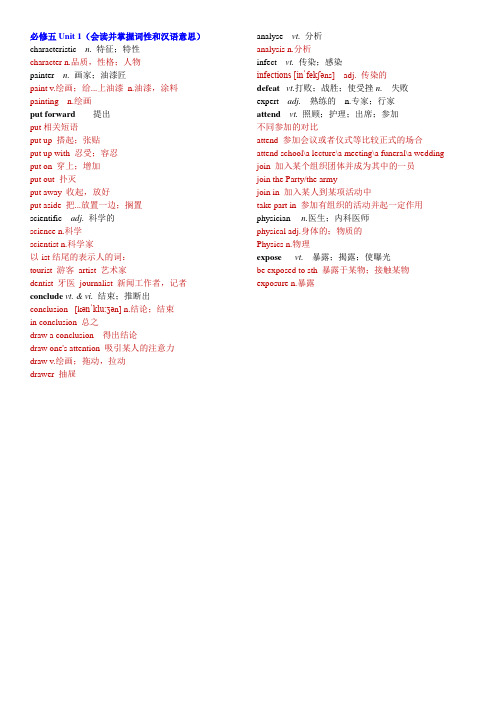
必修五Unit 1(会读并掌握词性和汉语意思)characteristic n.特征;特性character n.品质,性格;人物painter n.画家;油漆匠paint v.绘画;给...上油漆n.油漆,涂料painting n.绘画put forward 提出put相关短语put up 搭起;张贴put up with 忍受;容忍put on 穿上;增加put out 扑灭put away 收起,放好put aside 把...放置一边;搁置scientific adj. 科学的science n.科学scientist n.科学家以-ist结尾的表示人的词:tourist 游客artist 艺术家dentist 牙医journalist 新闻工作者,记者conclude vt. & vi. 结束;推断出conclusion [kənˈklu:ʒən] n.结论;结束in conclusion 总之draw a conclusion 得出结论draw one's attention 吸引某人的注意力draw v.绘画;拖动,拉动drawer 抽屉analyse vt. 分析analysis n.分析infect vt. 传染;感染infections [inˈfekʃəns] adj. 传染的defeat vt.打败;战胜;使受挫n. 失败expert adj. 熟练的n.专家;行家attend vt. 照顾;护理;出席;参加不同参加的对比attend 参加会议或者仪式等比较正式的场合attend school\a lecture\a meeting\a funeral\a wedding join 加入某个组织团体并成为其中的一员join the Party/the armyjoin in 加入某人到某项活动中take part in 参加有组织的活动并起一定作用physician n.医生;内科医师physical adj.身体的;物质的Physics n.物理expose vt. 暴露;揭露;使曝光be exposed to sth 暴露于某物;接触某物exposure n.暴露deadly adj. 致命的die v.死dead adj.死去的death n.死亡cure n. 治愈;痊愈vt. 治愈;治疗a cure for 治疗...病的方法cure sb. of sth 治好某人的病对比treat 治疗(过程,不强调结果);款待outbreak n. 爆发;发作break out 爆发(多指战争或火灾)challenge n. 挑战vt. 向……挑战challenging adj.挑战性的victim n. 受害者absorb vt. 吸收;吸引;使专心absorb oneself in sthsb be absorbed in sth 全神贯注于absorbed adj.全神贯注的suspect vt.怀疑n. 被怀疑者;嫌疑犯sb. be suspected of doing sth. 某人被怀疑做了某事enquiry n. 询问enquire v.询问也写作inquiry, inquire neighbourhood n. 附近;邻近neighbour n.邻居severe adj.严重的;剧烈的;严厉的clue adj. 线索;提示pump n. 泵;抽水机vt. (用泵)抽(水)foresee vt. 预见;预知investigate vt.&vi. 调查investigation n. 调查blame vt.责备;谴责n.过失;责备blame sth. on sb. 把某事怪到某人头上blame sb. for sth. 因为某事责备某人sb. be to blame 某人应受责备get/accept/bear/take the blame for...对...负责pollute vt. 污染;弄脏pollution n.污染polluted adj.受污染的handle n. 柄;把手vt. 处理;操纵germ n.微生物;细菌link vt. & n. 连接;联系link…to… 将……和……联系或连接起来sth. be linked to 某物被连接到.... announce vt. 宣布;通知announcement n.宣布,通告certainty n.确信;确实certain adj.确信的certainly adv.当然instruct vt. 命令;指示;教导instructor n.导师,指导者instructions n.说明书,用法说明=directions responsible adj. 有责任的;负责的be responsible for n.对...负责responsibility n.责任a sense of responsibility 责任感construct vt.建设;修建construction n. 建设;建筑物under construction 在建设中contribute vt. & vi. 捐献;贡献;捐助contribute to... 有助于,导致contribution n.贡献;捐款make contributions to...为...做贡献apart from 除……之外;此外firework n. 烟火(燃放)chart n. 图表creative adj.有创造力的;创造性的create v.创造creativity n.创造力,创造性co-operative adj.合作的co-operation n.合作operate v.操作,运转;做手术operation n.s手术;运转,运行positive adj. 积极的;肯定的;确实的反义词negative adj. 消极的(be)strict with sb.…对……严格的(be)strict in sth. 在...方面严格的revolutionary adj.革命的;重大变革的revolution n.革命movement n. 移动;运动;动作move v.移动;运动moved adj.感动的make sense 讲得通;有意义make no sense 无意义sense v.&n. 感觉;感官a sense of ... ....感a sense of humor / responsibility幽默感/责任感sensitive adj.敏感的backward adv. & adj. 向后地(的);相反地(的);退步地(的)forward 向前的put forward 提出look forward to doing sth.期望做某事loop n. 圈;环privately adv. 私下地;秘密地private adj.私下的;秘密的privacy n.隐私spin vi. & vt. (使)旋转;纺(线或纱)brightness n.明亮;亮度;聪颖bright adj.明亮的brighten v.使明亮-ness后缀的名词happiness, kindness, darkness, loneliness, sadness-en后缀的动词strengthen,widen,brighten,broaden,weaken,sharpe n,shorten enthusiastic adj. 热情的;热心的be enthusiastic about 对...热情的enthusiasm n.热情cautious adj. 小心的;谨慎的caution n.小心;谨慎reject vt.拒绝;不接受;抛弃rejection n.拒绝,否决表示拒绝的短语refuse to do sth.object to doing sth.be opposed to doing sth.universe n. 宇宙;世界universal adj.普遍的,全体的。
人教版英语必修五Unit 1(John Snow defeats_King Cholera)教学教案
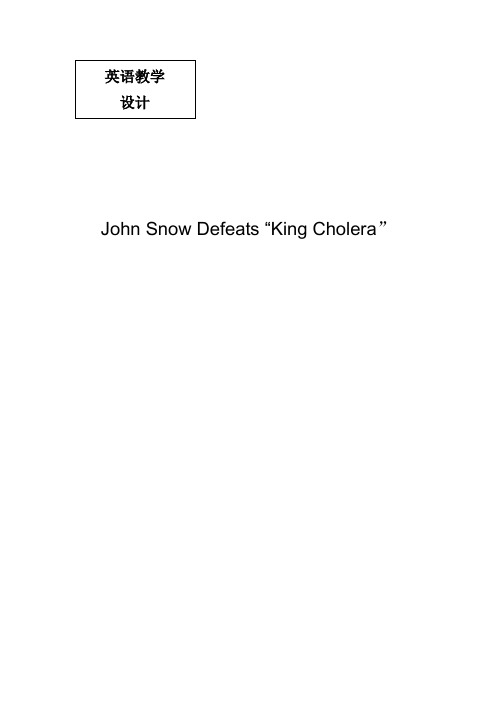
John Snow Defeats “King Cholera”Unit 1 John Snow Defeats “King Cholera”Teaching Goals:1. Enable the Ss to get to know some knowledge about Cholera.2. Enable the Ss to understand the passage well.3. Let the Ss learn some reading skills by scanning and skimming.4. To learn from the great scientists and develop the noble spirits . key points:1. To train the reading skills of skimming, scanning and careful reading;2. To master the details of the passage and appreciate the spirits of the scientists.Difficult points1. To develop the students’ ability of grasping the main idea of each paragraph.2. To get some detailed information by reading the text. Teaching methods1. Skimming & scanning2. Discussion methods3. Pair work of group4. CompetitionTeaching process:Step 1 Lead in本单元标题是伟大的科学家。
所以活动的设置为让学生说出自己熟知的科学家姓名、其发明、工作、生活的情况。
人教版英语必修五 Unit 1 Using Language

水星 金星 地球 火星 木星 )
Mercury Venus Earth Jupiter Saturn Uranus Neptune Pluto Mars
Can you use a good method to memorize them ?
Before you listen to the tape,
look at the screen and read the new
words in the material :
astronomer (天文学家)
astronaut (宇航员)
institute (研究所)
2 Listen to Parts 1 and 2 of the
YP: Well, he first studied at university to
be an engineer. Later he went to America to study for his doctor’s degree. It was then he began to work on rockets. SS: So it was lucky for our space programme that he came back to
2. Can you name the nine planets in the solar system?
Nine Planets In .
the Solar System
Mercury Venus Nine Planets Earth In the Solar Mars Jupiter System: Saturn Uranus Neptune Pluto
Unit1
Using Language
人教版必修五Unit1 Great Scientists 单词讲解

(一)词汇篇
主讲老师:***
Characteristic
n: 特点,特征,品质
1. quality 品质 2. feature 特点 特色 3. Character 特点
adj: 独特的,典型的
1.Special 特别的 2.Particular 独特的 3. typical 典型的
当Only if 条件状语从句放在句首的时候,且中间无逗号时主句要进行倒装
Only if you work hard can you make progress.
set 的其他词组:
1. Set off 离开,动身 2. Set up 建立 创建 3. Set aside 把…放到一旁,留出 4. Set down 写下 记下
Take in 吸入;领会,理解;欺骗
Take 的其他词组:
1. Take apart 拆开 2. Take back 撤回 退回 3. Take on 呈现 承担(责任) 4. Take over 接手,接管 5. Take … for granted 认为…理所当然 6. Take up 开始从事,占据空间,占用时间 7. Take off 脱下 起飞
announce that…. 宣布 ……
1. it is said that 据说
It is
announced
that
…据宣布(it是形式主语)
2. 3.
it is reported that 据报道 it is believed that 人们相信
4. it is well-known that 众所周知
indicate / infer from / learn from
(完整版)人教版高中英语必修五Unit1知识点详解

必修5 Unit1 Great scientistsPart 1. Warming up1.explain及物动词(vt.)解释;说明;阐明[(+to)][+wh-][+(that)]He explained that he had been cheated. 他解释说他是上当受骗了。
Can you explain how the machine operates?你能解释一下这机器是如何运转的吗?Please explain this rule to me.请给我讲解一下这条规则。
不及物动词(vi.)解释;说明;辩解I've got to explain about it. 我得解释一下此事。
2.characteristicn. 特征;特性Kindness is one of his characteristics.adj. 独特的I heard my friend’s characteristic laugh.be characteristic of sb./sth. 是.....的特性Such bluntness is characteristic of hin. 如此迟钝是他的特性。
3. Who put forward a theory about black holes?put forward 提出(建议等);提名;提前,把时钟往前拨He put forward a new plan. 他提出一个新计划。
May I put your name forward as a possible chairman of the committee?我能否提名你当委员会主席?[归纳拓展]put down 记下;镇压put out 关掉;熄灭put aside 放在一边;储存;保留put off 推迟;延期put up 建造;举起;张贴put on 穿上put away 收好选词填空(put off, put up, put forward, put aside, put out)①The plan that you _____ at the meeting is wonderful.②Many tall buildings were _____ along the road.③Firefighters have been called to _____ the fire in the city center.④He has a little money to _____ for a rainy day.⑤Don’t _____ until tomorrow what can be done today.Part 2. Pre-reading, reading and comprehending1. Do you know how to prove a new idea in scientific researchhow to prove a new idea 为“疑问词+不定式”结构,该结构可在句中作主语、宾语、表语等。
新人教英语必修五unit1词汇及语法解析

人教新课标必修五unit1词汇及语法解析1. characteristic用作名词,意思是“特点;特征;特性”与feature意思相近。
它也可用作形容词意为“典型的;具有…的特点的”。
Traffic jams are a characteristic of large cities. 堵车是大城市的特点。
The smell is characteristic of garlic. 这气味是大蒜的特点。
He speaks with characteristic passion. 他以特有的热情说话。
2. put forward的意思是“提出主意、计划(offer, suggest , an idea)等”。
He often puts forward some useful advice. 他常常提出一些有用的建议。
〖帮你归纳〗put的常用词组有:put aside节省(钱、时间);储蓄;把……放在一边put away储存(钱);放好put back拨慢;搁置put down放下;记下;击败;使(飞机)着陆;put off延期;推迟put on上演;穿上;戴上put out熄灭;关掉;扑灭put through接通电话;完成put up with忍受;忍耐put into action/effect/practice实施;实行3. examine的意思是“检查;审查;诊察;考察;测验”。
The doctor examined her carefully.医生仔细地给她作了检查。
The teacher examined the students on the book they read. 老师就学生读的书考学生。
examine指的是仔细观察以了解或发现什么东西,也可用于医生检查病人,以书面或口头的形式考察学生的知识与能力。
check指的是通过检查以确保某事物正确、安全、满意或处于良好状态,核对,核实某物等。
人教版高中英语必修五第一单元课件
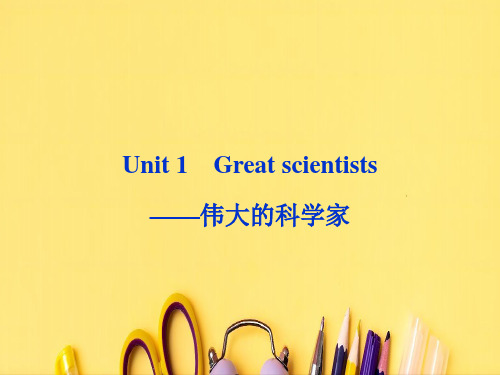
Unit 1 Great scientists——伟大的科学家
4 . prevent...from doing sth. 防 止 / 阻 止 ……做某事; suggest(建议)+宾语从句 _T_o__p_r_e_v_e_n_t _th__is_f_r_o_m__h_a_p_p_e_n_i_n_g__(为防 止这种情况发生)again,John Snow suggested that the source of all the water supplie _b_e_e_x_a_m__i_n_e_d___(被检测).
解析:选B。考查非谓语动词。根据 语境可知,felt与protect之间是被动关 系,排除选项A和C;和父亲一起的徒 步旅行已经结束,排除选项D。
栏目 导引
Unit 1 Great scientists——伟大的科学家
3 . (2012·北 京 东 城 期 末 )Lady Gaga
has put off her concerts because of the
栏目 导引
Unit 1 Great scientists——伟大的科学家
10.____b_e__a_g_a_in_s_t____ 反对 11.__(_b_e_)_s_tr_i_c_t_w_i_t_h_.._. 对……严格的 12.__b_e_t_o_b_l_a_m__e_____ 应受责备
栏目 导引
Unit 1 Great scientists——伟大的科学家
Unit 1 Great scientists ——伟大的科学家
栏目 导引
Unit 1 Great scientists——伟大的科学家
基础盘点自测自评
核心单词
1.The writer was so ___a_b_so_r_b_e_d___ ( 专心于)in her work that she didn’t notice Jim enter the room.
人教版 高中英语必修五:Unit1 Great scientists

Great scientists
Reading
Pre-reading
1.What impresses you most in 2003?
Which person impresses you most during the SARS?
What other infectious diseases do you know?
no wayຫໍສະໝຸດ (俚语)没门, 别想feel one’s way
摸黑走, 谨慎从事
on one’s way to… 在去…的路上
in this way=by this means=with this method 用这种方法
2.Who put forward a theory about black holes?
I don’t like the way __(_th__a_t/_i_n__w_h_i_c_h_) you
speak to your father. 我不喜欢你跟你父亲讲话的方式.
与way相关的短语:
by the way
顺便说
by way of … lose one’s way
通过…的方法 迷路
2. Who wrote a book
explaining how animals
and plants developed as
the environment changed? Charles Darwin (1808-1882) British author of The Origin of Species
C.He got interested in two theories that possibly explained how cholerakilled people
人教版高中英语必修五unit1课文重点练习详解

Unit 1 GREAT SCIENTISTSJOHN SNOW DEFEATS“KING CHOLERA”John Snow was a famous doctor in London — so expert, indeed, that he attended Queen Victoria as her personal physician. But he became inspired when he thought about helping ordinary people (who were) exposed to cholera. This was the deadly disease of itsday. Neither its cause nor its cure was understood. So many thousands of terrified people diedevery time there was an outbreak. John Snow wanted to face the challenge and solve this problem. He knew that cholera would never be controlled until its cause was found.(expose:1暴露be exposed to all kinds of weather.经受风吹雨打。
Expose sb to danger 使某人面临危险。
A student who has been exposed to English for some 6 years.接触英语达六年左右的学生。
2.揭露。
Expose a politician’s lies. He has been exposed as a liar.他说谎的行为被揭穿。
)He became interested in two theories(that possibly explained how cholera killed people). The firstsuggested that cholera multiplied in the air, a cloud of dangerous gas floated arounduntil it found its victims. From the stomach the disease quickly attacked the body and soon the affected person died.John Snow suspected that the second theory was correct but he needed evidence. So when another outbreak hit London (There was another outbreak)in 1854, he was ready to begin his enquiry. As the disease spread quickly through poor neighbourhoods, he began to gather information. In two particular streets, the cholera outbreak was so severe that more than 500 people died in ten days. He was determined to find out why.First he marked on a map the exact places(where all the dead people have lived). This gave him a valuable clue about the cause of the disease. Many of the deaths were near the water pump in Broad Street (especially numbers 163738 and 40). He also noticed that some houses (such as 20 and 21 Broad Street and 8 and 9 Cambridge Street) had hadno deaths. He had not foreseen this, so he madefurther investigations. He discovered that these people worked in the pub at 7 Cambridge Street. They had been given free beer and so had not drunk the water from the pump. It seemed that the water was to blame,Next, John Snow looked into the source of the water for these two streets. He found that it came from the river(polluted by the dirty water from London). He immediately told the astonished people in Broad Street to remove the handle from the pump so that it could not be used. Soon afterwards the disease slowed down. He had shown that cholera was spread by germs and not in a cloud of gas.In another part of London, he found supporting evidence from two other deaths(that were linked to the Broad Street outbreak.)A woman,(who had moved away from Broad Street,)liked the water from the pump so much that she had it delivered to her house every day. Both she and her daughter died of cholera after drinking the water.With this extra evidence John Snow was able to announce with certainty that polluted water carried the virus.To prevent this from happening again, John Snow suggested that the source of all the water supplies be examined. The water companies were instructed not to expose people to polluted waterany more. Finally “King Cholera”was defeated.COPERNICUS’REVOLUTIONAYTHEORY Nicolaus Copernicus was frightened and his mind was confused. Although he had tried to ignore them, all his mathematical calculations led to the same conclusion: that the earth was not the centre of thesolar system. Only (if you put the sun there) did the movements of the other planets in the sky make sense. Yet he could not tell anyone about his theory as the powerful Christian Church would have punished him for even suggesting such an idea. They believed God had made the world and for that reason the earth wasspecial and must be the centre of the solar system. (Only: we can succeed only in this way. →Only( in this way) can we succeed.)The problem arose because astronomers had noticed that some planets in the sky seemed to stop, move backward and then go forward in a loop. Others appeared brighter attimes and less bright at others. This was very strange if the earth was the centre of the solar system and all planets went around it. Copernicus had thought long and hard about these problems and tried to find an answer. He had collected observations of the stars and used all his mathematical knowledge to explain them. But only new theory could do that. So between 1510 and 1514 heworked on it, gradually improving his theory until he felt it was complete.In 1514 he showed it privately to his friends. The changes (he made to the old theory) were revolutionary. He placed a fixed sun at the centre of the solar system with the planets going round it and only the moon still going around the earth. He alsosuggested that the earth was spinningas it went around the sun and this explained changes in the movement of the planets and in the brightness of the stars. His friends were enthusiastic and encouraged him to publish his ideas, but Copernicus was cautious. He did not want to be attacked by the Christian Church, so he only published it as helay dying in 1543. (with﹢宾语﹢1)doing2)/done/3)介词短语/4)形容词5)副词6)to do:He slept with the window open (with the light on).The teacher came with a book in his hand (under his arm).With a lot of homeworkto do, I had to stay at home last weekend.With the crowds cheering, the royal party drove into the palace.With signal given, the train left the station.) Certainly he was right to be careful. The Christian Church rejected his theory, saying it was against God’s idea and people (whosupported it) would be attacked. Yet Copernicus’ theory is now the basis (on which all our ideas of the universe are built.) His theory replaced the Christian idea of gravity, (which said things fell to earth because God created the earth as the centre of the universe.) Copernicus showed this was obviously wrong. Now people can see that there is a direct link between his theory and the work ofIsaac Newton, Albert Einstein and Stephen Hawking.(辨析reject,refuse,turn down, decline.Reject:断然拒绝。
人教版高中英语必修五Unit 1 Great scientists 1.1
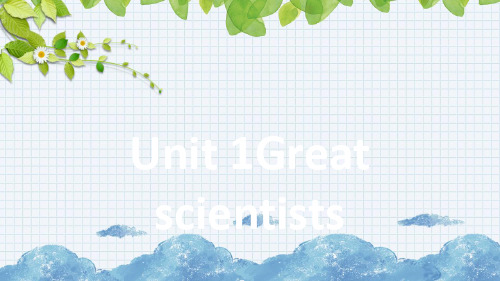
Section Ⅰ Warming Up,Pre-
一二三 四五
一、词义匹配
A
B
1.suspect a.to tell people something about a decision,plans,etc.
2.blame b.to deal with a situation,or a person
Unit 1Great scientists
【文章导语】 Have you heard of Newton,a famous scientist?There are many interesting stories about him.Here is one.
你听说过著名科学家牛顿吗?关于他,有许多有趣的故事。下面 就是其中之一。
adj.受污染的
一二三 四五
四、阅读课文JOHN SNOW DEFEATS “KING CHOLERA”,回
答下列问题
1.According to John Snow’s view,
.
A.Queen Victoria suffered a lot from bad health
B.a cure had been found for cholera before his time
C.cholera’s cause had to be discovered in order to control it
D.thousands of terrified people knew what they should do
答案:C
一二三 四五
2.Which of the following theories did John Snow believe in?
高中英语人教必修五unit1GreatScientists全单元优质教案
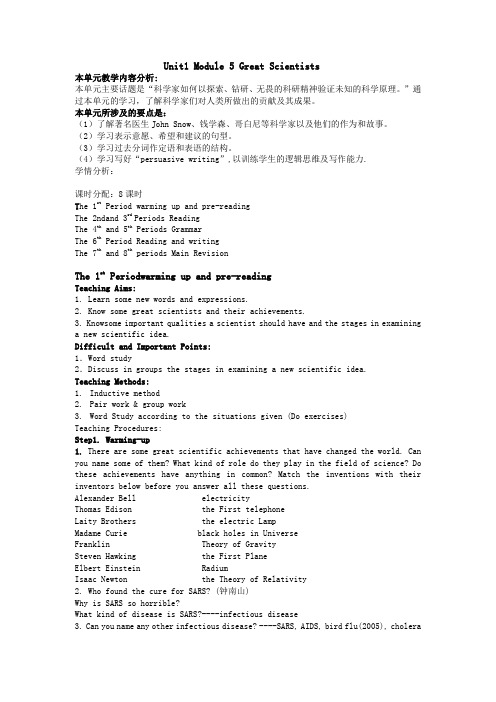
Unit1 Module 5 Great Scientists本单元教学内容分析:本单元主要话题是“科学家如何以探索、钻研、无畏的科研精神验证未知的科学原理。
”通过本单元的学习,了解科学家们对人类所做出的贡献及其成果。
本单元所涉及的要点是:(1)了解著名医生John Snow、钱学森、哥白尼等科学家以及他们的作为和故事。
(2)学习表示意愿、希望和建议的句型。
(3)学习过去分词作定语和表语的结构。
(4)学习写好“persuasive writing”,以训练学生的逻辑思维及写作能力.学情分析:课时分配:8课时T he 1st Period warming up and pre-readingThe 2ndand 3rd Periods ReadingThe 4th and 5th Periods GrammarThe 6th Period Reading and writingThe 7th and 8th periods Main RevisionThe 1st Periodwarming up and pre-readingTeaching Aims:1. Learn some new words and expressions.2. Know some great scientists and their achievements.3. Knowsome important qualities a scientist should have and the stages in examininga new scientific idea.Difficult and Important Points:1.Word study2.Discuss in groups the stages in examining a new scientific idea.Teaching Methods:1.Inductive method2.Pair work & group work3.Word Study according to the situations given (Do exercises)Teaching Procedures:Step1. Warming-up1. There are some great scientific achievements that have changed the world. Can you name some of them? What kind of role do they play in the field of science? Do these achievements have anything in common? Match the inventions with their inventors below before you answer all these questions.Alexander Bell electricityThomas Edison the First telephoneLaity Brothers the electric LampMadame Curie black holes in UniverseFranklin Theory of GravitySteven Hawking the First PlaneElbert Einstein RadiumIsaac Newton the Theory of Relativity2. Who found the cure for SARS? (钟南山)Why is SARS so horrible?What kind of disease is SARS?----infectious disease3. Can you name any other infectious disease? ----SARS, AIDS, bird flu(2005), choleraH1N1,HFMD(手足口病)Step2. Pre-reading1. Cholera may be rare nowadays except in some poor areas, but back in the 1830s-1840s, it was probably No.1 killer in the world. There were four outbreaks of cholera in the 1830s and 1840s, which killed many thousands of people in the industrial cities of England. In 1854 on August 31st “the most terrible outbreak of cholera which ever occurred in the kingdom” began. It was so violent and sudden that 127 people around Broad Street died in the first three days. And then a famous physician John Snow discovered the source of the disease and since then Cholera was finally brought under control.2. How did he solve the problem of cholera? Actually, he followed a scientific procedure to carry out his scientific research. The whole procedure is made up of 7 steps. Can you put them in a right order?Draw a conclusion Think of a method Collect results Make up a question Find a problem Analyze the results Repeat if necessaryStep 3 SummaryStep 4 Homework Assignment1.Read the passage John Snow Defeats “King Cholera”.2. Learn the new words by heart and prepare for tomorrow’s dictation.课后反思:The 2ndand 3rd Periods ReadingTeaching aims:1. Learn some new words and expressions.2. Improve the students’ reading skills.3. Know how to prove a new idea in scientific research.Difficult and Important Points:(1)Reading comprehension(2)What did John Snow do to prove a new idea in scientific research?Teaching Methods:1. Group work2. Competition3. Illustration4. Deductive MethodTeaching Procedures:Step 1Lead inBackground introduction to John SnowJohn Snow (1813-1858) was born and worked as a doctor in Great Britain. He was originally an anesthetist(麻醉师).He was so famous that he became the doctor for Queen Victoria at the births of her many children.Four outbreaks of cholera in the 1830s and 1840s killed many people in England. In 1854, “the most terrible outbreak of cholera which ever occurred in the kingdom” began. It was so violent and sudden that 127people died in the first three days. Step 2 Skimming and ScanningMore questions are given to get the general ideas of this passage and some obvious facts.Who defeats “King Cholera“? John SnowWhat happened in 1854? Cholera outbreak hit London.How many people died in 10 days? 500Why is there no death at No. 20 and 21 Broad Street as well as at No. 8 and 9 Cambridge Street?These families had not drunk the water from the Broad Street pump.Step 3 Reading for details1. Why couldn’t the cholera be under control at first?Neither its cause, not its cure was understood.2. Which theory did John Snow believe in?People absorbed cholera into their bodies with their meals.3. John Snow finally proved the theory he believed by ________.gathering information with the help of a maplooking into the source of the water for Broad Street and Cambridge Street Separating those who suffered cholera from those who didn’tBoth A and B (right choice)4. To prevent the cholera from spreading again, what did John Snow do? Suggested that the source of all water supplies be examine. Suggested that new methods of dealing with polluted water be found. Instructed the water companies not to expose people to the polluted water anymore.Step 4 Summing up: Read the passage silently and quickly and match the stages ofThe same with above:Find a problem draw a conclusion Think of a method Collect results Make up a question Analyze the results Repeat if necessaryParagraph 1: Introduction of John Snow and CholeraParagraph 2: Two theoryParagraph 3-5: Study of the breakout in 1854Paragraph 3: Think of a method: Test two theoryCollect the result: Mark the deathAnalyze the result: Reason for death and no deathParagraph 4: Analyze the result: Find the resource of the waterParagraph 5: Repeat if necessary: Find more evidence.Draw a conclusion: Cholera was spread by germPolluted water carried cholera Paragraph 6: Prevention of CholeraStep 5 Retell the passage (文章缩写仅供参考)Provide ss with a summary with some blanks. Let them retell the passage as well as pay attention to some important words.Read the passage again and fill in the blanks:John Snow was a well-known ____ in London in the ___ century. He wanted to find the ______ of cholera in order to ______ it. In 1854 when a cholera ____ out, he began to gather information. He _____ on a map where all the dead people had lived and he found that many people who had drunk the dirty water from the ______ died. Sohe decided that the polluted water carried cholera. He suggested that the _____ of all water supply be _______ and new methods of ________ with polluted water be found. Finally, “King Cholera” was defeated.Key: (见课文和教师用书)Step 6Language learning1.So many thousands of terrified people died every time there was an outbreak. 每当(疾病)突发时,总有成千的人死去【句型剖析】 1)本句是一个复合句,every time引导的是一个时间状语从句,意思是“每当……”,相当于“when”。
人教版高中英语必修五教材(全册)

人教版高中英语必修五教材(全册)本教材分为六个单元,内容涵盖了语法、词汇、阅读、写作等多个方面,旨在帮助学生综合提高英语能力。
下面是各单元的主要内容概括:Unit 1: Great Scientists介绍了几位杰出的科学家,如达尔文、爱因斯坦等,并探讨了科学和技术的发展。
通过阅读科学家的传记,学生们可以研究到科学家的职业生涯,从而了解科学是如何不断进步的。
Unit 2: The Environment本单元主要围绕环保展开。
内容包括环境问题、环境保护、可持续发展等话题的讨论。
通过这些话题的研究,学生们可以了解到我们面临的环境问题以及如何保护环境。
Unit 3: Music介绍了各种类型的音乐,包括古典音乐、摇滚音乐、流行音乐等,并通过音乐相关话题组织研究活动。
此外,还有关于音乐史和音乐家传记的阅读材料,使学生对音乐有更全面的了解。
Unit 4: Films and TV介绍了电影和电视节目的类型,如喜剧、动作片、纪录片等,并展开了有关电影制作和电视节目制作的话题。
通过与电影电视有关的材料,如影评、采访等,学生们可以提高听、说、读写各方面的能力。
Unit 5: Inventors and Inventions介绍了一些伟大的发明家和他们的发明,如爱迪生、贝尔等。
通过了解这些发明家的生平及其发明,学生们可以更好地理解科技与人类社会的发展历程。
Unit 6: Health围绕健康话题展开,包括饮食惯、锻炼、心理健康等。
同时,还有关于一些健康问题和疾病的介绍,如艾滋病、癌症等。
通过这些话题的研究,学生们可以了解到如何保持一个健康、积极的生活方式。
整本教材主要采用了趣味性、实用性和交际性的教学方法,旨在引导学生尽早进入英语学习环节,从而提高自己的听说读写能力。
